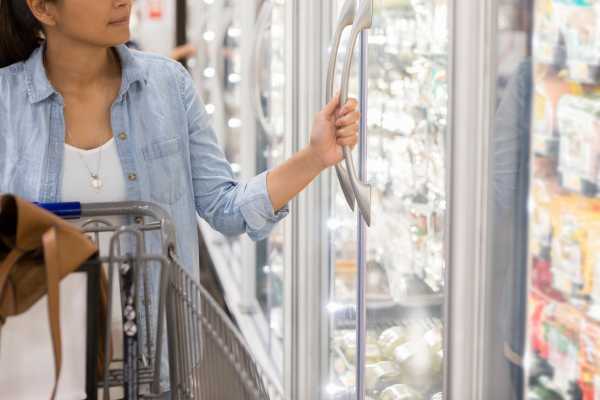

Walgreens is participating in a pilot of Cooler Screens, a Chicago-based startup that uses Microsoft technology to convert the typical frozen food aisle into a tunnel of personalized, super-targeted ads, as Fast Company’s Katharine Schwab reported Wednesday.
The new freezer doors have cameras, motion sensors, and eye-tracking capabilities, which allow them to guess a shopper’s gender and age, as well as note how much time they spend looking at individual products. The screens use this information to select which ads to display and which promotions to show.
According to the Fast Company piece, they can even figure out “your emotional response” to individual products. Cooler Screens makes a lot of bold claims throughout its first big trade publication profile, including that, since the doors don’t store any data and the data is anonymized, there is no reason to disclose to in-store customers that they are being watched and manipulated. Also that in the first two months of the pilot, sales of products advertised on the doors grew “more than 20 percent” year over year. And that the first Walgreens pilot location in Chicago saw “double-digit, same-store sales growth for the Cooler Screens section as compared to the rest of the pharmacy.”
(Cooler Screens did not respond to Vox’s request for comment.)
CEO and co-founder Arsen Avakian is best known as the founder of Argo Tea, which he once said he wanted to be “the Starbucks of tea” and then pivoted to “the Apple of tea.” (It is pretty successful tea.) He illustrated the usefulness of the doors from a consumer standpoint to Fast Company by saying that if the door watches you pick up “a six-pack of MillerCoors,” it might offer you a deal on a DiGiorno pizza. This is the same pro-ad-targeting argument that Mark Zuckerberg uses — that people don’t mind aggressive tracking of their behavior and interests as long as it results in “relevant” ads.
(One might also guess that ads will display products more commonly purchased by women — diet ice creams, low-calorie frozen meals — to women, when they realize a woman is shopping, regardless of whether what she really wants is full-fat Ben & Jerry’s or a Stouffer’s lasagna.)
Cooler Screens uses the same pro-ad-targeting argument as Mark Zuckerberg: people shouldn’t mind if it results in “relevant” ads
Cooler Screens has reportedly booked ads from “more than 15 of the 20 top consumer packaged goods companies,” which presumably means 16 or 17 of the 20 top consumer packaged goods companies? Coca-Cola, Pepsi, Nestle, MillerCoors, and Anheuser-Busch are given as examples, and it’s implied that ice cream brands are another target. The doors are installed at no cost to store owners, in exchange for the privilege of selling ads on them.
The company currently has only $700,000 in funding, according to Crunchbase, but Cooler Screens counts Microsoft, Foxconn, and the door manufacturer Dover as technology partners. The claims may be a little out there, but the doors exist, and they’re going to be in major businesses. Maybe it’s comforting to you that you will never be alone, even while shopping for frozen TGI Friday’s apps? Or maybe you can convince yourself it’s comforting, since you have no other choice.
Coca-Cola, Pepsi, Nestle, MillerCoors, and Anheuser-Busch are already Cooler Screens customers
Facebook ad targeting and the intricacies of how our behavior is tracked across the web are still murky concepts, but we all understand physical posters. Posters in a grocery store, with images of products on them, are ads, and they are shown to everyone. You see a poster for a deal on ketchup, and you quickly evaluate whether you need ketchup or you tune it out.
Posters are kind of no big deal — or have been, until now. We have arrived at the point in time when digital ad-targeting practices hit the real world, starting with these highly personalized ads in the cooler and freezer aisles at your local pharmacy-grocery hybrid.
And whether or not this particular project takes off exactly in the way its CEO is promising, you can definitely expect motion sensors, heavy surveillance, and eye tracking to become a common part of the brick-and-mortar shopping experience. Walmart has alluded to incorporating these techniques at its self-checkouts to prevent theft (without going into detail because “bad guys watch the news too”), and Amazon’s plan to open 3,000 cashierless convenience stores — reliant on elaborate systems of sensors and cameras — seems to be full steam ahead, on track to be completed by 2021. Even Sunglass Hut is already using floor trackers. Soon, no browsing — digital or physical — will go undetected.
Sourse: vox.com






